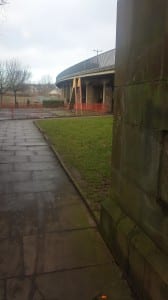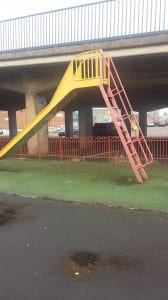Over the last couple of weeks we have been exploring the idea of different types of journeys. Firstly as a group embarking on our drift we set out to explore the city in a different way. By not being compelled by direction it really allowed us explore different parts of Lincoln and begin to question certain things. For instance, we came across a old abandoned park (which we have decided to include in our performance) under the fly-over. Looking at what use to be bright colours on the slide it promoted us to think of how the park would have originally looked when first built, and more importantly the children who would have used it. This has given us the topic of ‘The Children of Lincoln’ to research into for our performance.
Another form of journey that we have looked at it that of an ‘Imaginary Walker’. After reading the article by Coverley, it inspired me to think of journeys as not only a physical one, but as a mental one as well. If we can recreate this essence of travelling with minimal movement that that opens up a lot of opportunities for our group to explore. An idea of which is exploring time by talking our audience through the past, present and future of Lincoln, and the children growing up within the city in particular. A quote that resonated with me from the text is that it is “better to travel than to arrive”. Especially with the whole of the city being the site we’re looking at by focusing on the journey rather than the final destination its allows the audience to explore, as we did on our drift, a different side to Lincoln and lets the audience to notice things they have never seen before.
Anna Starbuck
Works Cited: Coverley, M. The Art of Wandering: the writer as walker. Harpenden: Oldcastle Books


Hi Anna. It is good that you are thinking about Coverley’s text here. You can expand this further by using another text to set up a discussion and/or a debate. What can you find about the flaneur? How does this connect with the wanderer? Is the flaneur gendered? Are children wanderers?
There are some careless mistakes with the writing though – and it would be a shame for you to submit work at the end of this process with these mistakes in, for example ‘a old’ should be ‘an old’ and ‘promoted’ should be ‘prompted’. Write in a word document first so that you can check for mistakes.